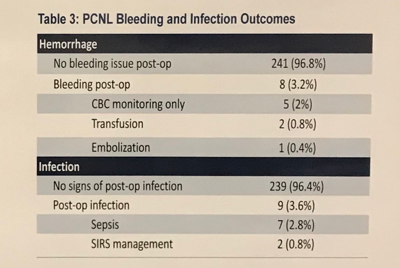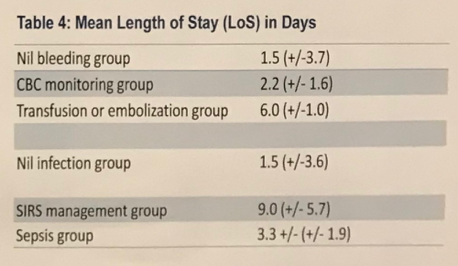To test this idea, their research team conducted a retrospective chart review from January 2014 to December 2015 while excluding renal transplant, strictures, and urothelial tumors. After completion of the study, 248 cases were identified with a mean age of 55.9 years, mean ASA score of 2.5, and a mean length of stay in the hospital of 1.59 days (± 3.6). The majority of patients (87%) had no anticoagulation following during preoperative evaluation while 69% had a negative preoperative urine culture. Following the procedure, 8 patients (3.2%) had bleeding while only 2 received a blood transfusion and 1 received embolization. Additionally, 7 patients contracted sepsis and 2 underwent SIRS management. Of note, the CBC monitoring group had a length of stay of 2.2 days (± 1.6). Additional information regarding postoperative information is shown below.

 In conclusion, Dr. Kroczak and his team determined that routine postoperative CBC tests following PCNL does not improve identification of hemorrhage or infection. He went on to explain that abnormal vital signs alone identified all patients that required further treatment such as blood transfusion or embolization as well as sepsis or SIRS management. However, Dr. Kroczak also state that a postoperative CBC may be beneficial in preoperatively determined anti-coagulated patients.
In conclusion, Dr. Kroczak and his team determined that routine postoperative CBC tests following PCNL does not improve identification of hemorrhage or infection. He went on to explain that abnormal vital signs alone identified all patients that required further treatment such as blood transfusion or embolization as well as sepsis or SIRS management. However, Dr. Kroczak also state that a postoperative CBC may be beneficial in preoperatively determined anti-coagulated patients. Presented by: Tadeusz Kroczak, MD
Written by Zachary Valley, Department of Urology, University of California-Irvine, at the 73rd Canadian Urological Association Annual Meeting - June 23 - 26, 2018 - Halifax, Nova Scotia


